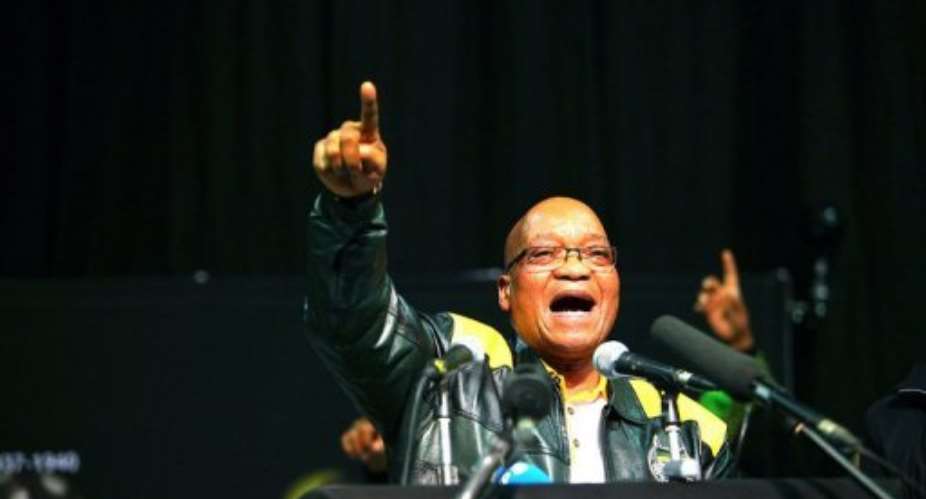JOHANNESBURG (AFP) - South Africa's economy is still under apartheid-era white minority control and blacks must reclaim the continent's financial and mining powerhouse, President Jacob Zuma said on Tuesday.
Zuma told a key meeting of his ruling African National Congress that a new economic direction was needed 18 years into after the end of apartheid.
"The structure of the apartheid economy has remained largely intact and has not included higher or inclusive growth," Zuma told thousands of ANC delegates in his opening address at a four-day policy conference.
"The ownership of the economy is still primarily in the hands of white males as it had always been," he added.
Blacks own at least 17 percent of the Johannesburg Stock Exchange (JSE), the continent's largest bourse, according to an on-going study by the JSE.
Foreigners however own half the JSE, presenting a conundrum to the party's statements.
The party is facing increasing pressure over massive social inequalities, poor service delivery and a jobs crisis which it has failed to rein in after being handed consistent wins at the polls since the first free vote in 1994.
"The ANC must democratise and deracialise the ownership and control of the economy by empowering the African community and blacks in general," said Zuma who will bid for another term as party leader in December.
South Africa's negotiated settlement ahead of the historic vote which put Nelson Mandela in office meant compromises were made in the national interest, Zuma said.
"On the economy we need to go back to the basics and take a different decision which we could not in 1994," he said.
Despite persisting inequality, the country's black middle class grew to 2.6 million since then, brought about by empowerment policies to promote blacks in company appointments and government tenders.
The same policies also made the fortune of the country's richest black man, Patrice Motsepe, whose wealth was estimated at $3.3 billion (2.6 billion euro) by Forbes magazine last year.
Motsepe's mining company African Rainbow Minerals was one of the sponsors of a banquet before the policy conference started.
The ANC hopes the conference will yield a five-year plan to give the economy fresh impetus.
The continent's biggest economy is facing slowing growth with a forecast of 2.7 percent for the year.
Around 3,500 delegates from nine provinces were expected to debate issues that include the sensitive topics of land reform and greater state control of the key mining sector.
Amid fears over the nationalisation of mines, one policy document recognised that "complete nationalisation or 51 percent would be totally unaffordable and could put our country into a situation where we lose fiscal sovereignty," while forced nationalisation without compensation would cause expensive lawsuits.
It proposes instead a 50-percent windfall tax, and state involvement in the sector through a state mining company.
"A thriving private sector is necessary for our economy to grow and must be protected," the document said.
The state's ailing land programme, in which it buys property to hand to blacks, will also be on the agenda amid a current overhaul of policies that have largely failed to dent one of apartheid's most visible legacies.
"Our position is that the current willing-seller-willing-buyer model must be renewed," Zuma reiterated.
"It tends to distort the land market through inflating the prices of land earmarked for restitution. It makes land reform expensive and delays land restitution to the poor."
Little progress has been made to restore land to people forced away before and during apartheid. White South Africans -- around 10 percent of the population -- still own as much as 80 percent of the land.
Eighteen years after the transition from apartheid to democracy, critics accuse the ANC-led government of not doing enough to reduce poverty and inequality.
The conference will make policy suggestions to be considered at the ANC national conference in December, when the party will hold its leadership election for which Zuma is considered the frontrunner.
Though the campaign for the top post will not be discussed officially at this week's conference, unofficial lobbying among delegates is expected with internal challenges from members unhappy with his leadership.





 Dumsor: Energy sector ‘shepherdless’ – Nana Amoasi VII
Dumsor: Energy sector ‘shepherdless’ – Nana Amoasi VII
 Train accident: Four more grabbed and remanded
Train accident: Four more grabbed and remanded
 Gov't to consolidate cash waterfall revenue collection accounts
Gov't to consolidate cash waterfall revenue collection accounts
 Gov't to settle lump sum for retired teachers by April 27
Gov't to settle lump sum for retired teachers by April 27
 Former PPA CEO granted GH₵4million bail
Former PPA CEO granted GH₵4million bail
 Dumsor: The darkness has exposed you; you’ll go down as the worst in Ghana’s his...
Dumsor: The darkness has exposed you; you’ll go down as the worst in Ghana’s his...
 Dumsor: The ‘incompetent’ person provided a timetable whiles those who came to s...
Dumsor: The ‘incompetent’ person provided a timetable whiles those who came to s...
 Defend, ensure NPP’s good works are ‘sold’ and highlight the ‘bad’ state of the ...
Defend, ensure NPP’s good works are ‘sold’ and highlight the ‘bad’ state of the ...
 Bawumia will rank high ahead of Mahama in any anti-corruption test — Salam Musta...
Bawumia will rank high ahead of Mahama in any anti-corruption test — Salam Musta...
 NPP trying to bribe us but we‘ll not trade our integrity on the altar of corrupt...
NPP trying to bribe us but we‘ll not trade our integrity on the altar of corrupt...
